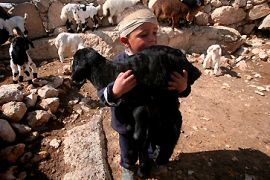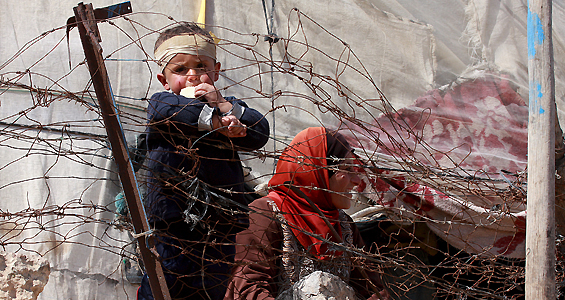West Bank bedouins to ‘stay put’
Al Jazeera’s Zeina Awad says they are determined to fight Israeli land seizures.

 |
| The bedouins fight for their livelihood which is threatened by Israeli settlement expansion [EPA] |
The bedouins of Umm Al Khayr, a small town south-east of Hebron, may be among the most vulnerable Palestinian refugee communities in the West Bank, but they are fighting to keep the land they have lived on for generations.
They have been battling the Israeli army in the courts to prove that the land they live on is theirs, and to block a so-called security patrol road from being built.
On April 26, they faced off against the Israeli army to stop the road from reaching deep into their residential areas.
With the help of international and Israeli anti-occupation activists, the bedouins were able to prevent the bulldozers from cutting through their homes.
They scored a minor victory, but they know this could only be temporary and they recognise that their battle has just begun.
“They want to build a security road but they’re building it at our expense,” 23-year-old Eid al-Hathaleen, whose family owns some of the land being appropriated, told Al Jazeera.
“This is all about stealing our land and they are using security as an excuse. They didn’t even tell us they were going to do this, they just started digging one day.”
The 21 families living in Umm Al Khayr settled here when their great grand-parents became refugees following the creation of the State of Israel. Some of the families – like Eid’s – purchased the land when the West Bank was still under Jordanian rule prior to the 1967 Six Day War.
Grazing grounds
The plots of land that have been seized by the Israeli authorities once made up some of the community’s best grazing land which they had depended on for their livelihood.
| In video | ||
|
Their herds feed off the grass there and drink from the local well.
As the Israeli occupation authorities forbid the bedouins from building any extensions to their houses, most homes do not have indoor toilets. As a result, the community uses the open space for that purpose as well.
The families first started losing land in the 1970’s, when the first plot was confiscated to build a brand new Jewish-only neighbourhood next door.
That neighbourhood today is the illegal Karmel settlement. Settlers there are known to be among the most violent in the West Bank, attacking the bedouin community on a regular basis, beating and pelting them with rocks, and stealing their cattle.
Ownership denied
In 2004, Israeli authorities began to expand beyond the security fence surrounding Karmel in the hope of expanding the settlement; the latest Israeli measure is to build the so-called security patrol road through this area.
Israel rejects the bedouin community’s ownership of the land. Gayath Nasser, the lawyer representing Eid’s family, has asked Israel’s high court to order an immediate cessation of the road works until the case is decided.
But Nasser says the court is dragging its feet; it still has not granted him the order. He says even if he were to win the case, he will not be able to prevent damage being done to the land and property.
Al Jazeera contacted the Israeli civilian authority that is in charge of running the West Bank to hear their side of the story.
They directed us to the Israeli army, which refused to grant us an interview, sending us a statement by email instead, stating that the road is being built for security reasons and that the works have received all the necessary authorisations.
In the courts
Now, it is down to the army’s word against the bedouin community’s in the courts. Nasser showed us the al-Hathaleen’s title deed and the map detailing the land allotment – documents he hopes will make his case. However, Nasser is aware that the odds are stacked against his clients.
“We have to deal with an Israeli court not an international one,” he said.
“The authority to judge Israeli actions in the West Bank should not be in courts of the occupying state, it should be in either a West Bank or an international court.”
Moreover, the land being taken falls within Area C which makes up 60 per cent of the West Bank and is under full Israeli control.
Eid says the so-called security road should be completed in the coming weeks. When it is, it will likely be fenced off and open to Jews only. But despite his community’s hardships, Eid says they will stand firm.
“There is no other land we own,” Eid says.
“That’s why we are not going anywhere we are staying here, even if we have to suffer through violence and face ongoing demolitions, we will stay put.”
